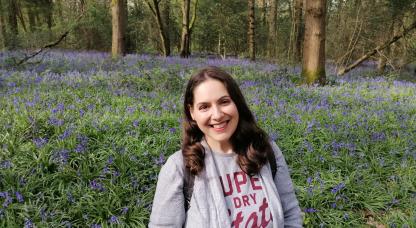Spencer Bull was the vice-captain of the GB squad at last month’s Invictus Games. Here the British Army Lieutenant Colonel talks to us about “taking back control” following an MS diagnosis.
Spencer Bull talks MS, the Invictus Games and taking back control
13 November 2018

I didn’t know much about MS when I was diagnosed in 2005 and I still feel emotional thinking back to that moment. I was serving in the army at the time and was posted in Kuwait. I was doing a lot of sporting stuff; and after one rugby match I started getting pins and needles in my fingers and extremities. I convinced myself that I’d just trapped a nerve somewhere.
In 2005, I came back to the UK and it came back again. So I decided to get it properly looked at. Next thing I knew I was in a cycle of seeing various doctors. I should of recognised what was happening when I was having MRI scans and lumbar punctures, but I didn’t and in my mind I was still thinking it was some form of spinal injury. In 2005, a neuro-specialist said ‘you have MS’. I felt angry; I’m a soldier, I’m fit and healthy. What are you telling me? I was in a bad place. I’d heard of it but didn’t know what it meant. I wasn’t really listening, as all that’s going through my mind is what is this going to mean? Will I have to leave the army? What about my family?
If you’re in the military and facing a medical discharge, you’re not just losing a job, you are also losing a support network and a house. So suddenly you have many things to start thinking about. I wasn’t an easy person to be around. I was trying to deal with it but I didn’t want to talk about it. I made life hard for the people I’m trying to protect. They were dancing on eggshells around me, because I didn’t want to talk about it. It took me five years to come to terms with the diagnosis. It takes times to go through it and you have to wrestle with it for a long time.
At that point I was starting to take control back. I’m in charge; I’m determining my future not the MS.
I found support through an MS charity for the armed forces (Mutual Support), speaking to people there helped a lot. I realised I had to change; I had to address it. I was hiding it from a lot of people at first, but then there was a moment. I was on a course with work and there was a group photo. I was positioned right at the back, in the middle at the top. The photo was taken and I thought, how am I going to get down? I tried to get down off the benches and scared myself senseless and I just thought I’ve got to do something about this. That was the trigger. At that point I was starting to take control back. I’m in charge. I’m determining my future not the MS. My motto is live for the day, plan for the future.
It was my decision to start using a wheelchair and to take control back. Using a wheelchair has given me independence. Yes it’s a pain, but it means I can go into a room, I can move around, I can engage. It took me a while to be seen in public in it, but once I’d accepted it, it has made such a difference.
I’ve always loved sport and I was getting really fed up sat on the side-lines watching the kids play but not doing anything myself. Through Sport Recovery I started reengaging with sports I’d previously done, but in an adaptive way.
I was medically discharged from the army in December 2017, so I decided to trial for the Invictus Games this year. I focused on sports I could do with my kids, so I trialled in swimming, sailing, cycling on a hand bike, and also opted for the seated shotput. I did the trials and didn’t think I would be chosen, but was told I’d been selected and they also wanted me to interview for a captain role. I got selected as vice-captain and I felt honoured, privileged and chuffed to bits.
It’s just amazing to be on this adventure. I’m hoping to show that everyone has ‘something’, and that’s the thing that helps you move forward. Mine is sport, for someone else it could be art, or music it could be whatever. My message to anyone would be try and work out what ‘it’ is - we’ve all got ‘it’, it’s just finding ‘it’. And when you have found ‘it’, you’ll look back and go, that’s great. Give it a go! It gives you - in the words of Star Wars - a bit of hope and we all need hope.
Find out more
Latest news & stories
Sign up to updates from us
Keep up-to-date with the latest MS news, explore new research, read the stories of people living with MS, find out practical tips from MS experts, and discover exciting fundraising opportunities
If you would like to sign up for post or telephone (SMS) updates you can complete our sign up form here


